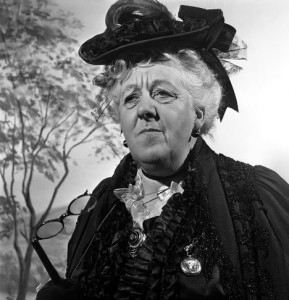
England, 1951, British actress Margaret Rutherford is pictured in a scene from the film “The Magic Box.” She was considered the definitive Miss Marple, the famous sleuth in Agatha Christie novels. (Photo by Popperfoto/Getty Images)
I love to read Agatha Christie novels. They are not great literature, but when you have spent the day reading about the causes of World War I or about the economic policies leading up to October 1929, a good murder mystery is just the thing to lull one into a deep sleep.
One of my favorite Christie characters is Miss Marple, the maiden lady in St. Mary’s Mead who is so very insightful. She knows all the dirt in the village. As I was looking through my Greenville files, I realized how much Miss Marple was like newspaper editors here in the early 1900’s. They knew all and told all.
More than 100 years later, I find myself asking, “How could they print that?” The answer is simple. That was all the news to print, plus it’s what the readers wanted.
For example, in 1906 we learn that Charles C. Nix received the appointment as state organizer for the Journeymen Barbers’ International over Oklahoma and Indian Territory. So how did that get in the Greenville Messenger? Nix and his wife were from Wire Grass south of Greenville.
The same year all Kentuckians in Greenville and Hunt County organized a county organization at City Hall. What was the purpose of such a fine group? Who knows?
Then there are the lawsuits filed against the railroads. G. R. Lasater filed suit against the Katy for $25,000 damages, alleging personal injury at Emory while working as a car repairer with the wreck crew. D. W. Farris filed suit against the Katy for $10,000, alleging injury to his son two years ago in a collision. John Ames filed suit against the Cotton Belt for $20,000. He claimed his wife was thrown from her seat and injured while that train was switching at Noel Junction.
One of the best claims was from J. A. Baer, who was thrown from his cultivator and hurt some weeks ago west of Clinton. He sued the Cotton Belt for $10,000 damages, alleging that their train frightened his mules, causing the runaway. He suffered a broken collarbone and a jaw hurt with his false teeth and otherwise bruised up.
Often it was the railroad that brought suit against the county. In the case of Santa Fe vs. Hunt County, a decision was rendered in favor of the county. Many farmers throughout Hunt County were kept here several days as witnesses in this case. The railroad objected to paying tax on the full value of their intangible assets and tried to show that Hunt County property was not rendered at full value.
William Bacon, cotton buyer and city booster urged the member of the Hunt County Fair Association to change its name to the North Texas Fair Association. The group agreed believing the new name would better represent the larger territory represented by the successful fair. Both Bacon and his wife were strong supporters of the cotton industry.
Mr. Smith was fined in city court for peddling jewelry without license. S. S. Kamal was fined for obstructing the sidewalk. M. C. Wolfe was in town advertising the mineral red water of Mt. Pleasant. He urged everyone to take advantage of Saturday excursions on the Cotton Belt to visit the wells. Round trip was $1.00.
